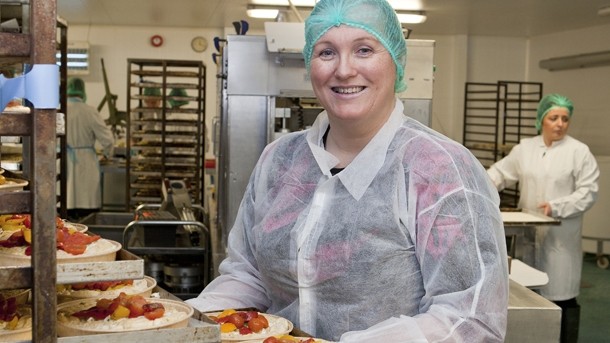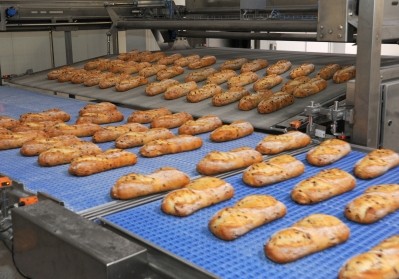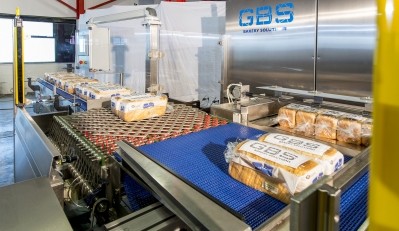Bakery's business booster

Waitrose is our largest customer and we supply its stores with handmade own-label pastry products, which are sold on their deli counters. We also supply Ocado and Costco.
The business has been going for three years now. It was set up by my bosses Charles Coleman and John Pearson, who hired me two years ago to drive change in the factory, boost its efficiencies and help to grow the business.
I’ve been working in the food industry for more than 15 years. I started with McVitie’s after getting my bachelor’s degree in Food and Consumer Management from the Birmingham College of Food. I moved onto Geest Prepared Foods as a night shift manager in 2000 and I was promoted to departmental manager of prep and cook in 2002. Three years later I became an area manager for Samworth Brothers and moved on to Buckingham Foods and then to Amy’s Kitchen before becoming the factory manager here.
John and Charles, who have worked in the food industry for 25 years each, set up the business after spotting a gap in the market for high-quality delicatessen products for supermarkets. We supply tartlets, pies, sausage rolls, quiches and other pastry items, which are all handmade at our factory in Milton Keynes.
The business currently turns over £5M and we produce upwards of 50,000 units a day. However, we’re only running at 60% capacity and we’re working towards turning over £7M, which is a capacity the factory would be able to manufacture quite comfortably.
Boosting output (Return to top)
To boost our output, John and Charles are in talks with some of the major multiples to supply them with food-to-go products, which is an area they would like to see the business grow into next.
But, I focus on the factory and making sure it has the capability to meet the business John and Charles bring in. The factory is 1,858m² and was bought for £2.5M from a bakery firm that supplied Aldi and Lidl. We've since invested £750,000 in new equipment to help us make more products. We’ve also invested in infrastructure and moved all of our office functions onto this site. Chill and freezer space, as well as dispatch, have also been extended.
There is only one production line, which we run with 35 staff who work five days out of seven from 6am until 3pm.
Our Roquefort and pear tart starts with handmade pastry (we use the same pastry for other products too), which is rolled out and pressed into tins by hand and then crimped by hand. It is then put onto a rack before being blind baked and cooled. A lot of mass-produced pastry isn’t blind baked first, which means there isn’t that heat penetration, which quite often leaves the pastry raw and soggy in the middle.
While the pastry is being prepared, other parts of the tart will be in production in other sections of the factory. One person will be working on the sauce, while others will be preparing the cheese, chives, leeks, onions and pears at the same time.
Once the individual components are ready, they are brought together for assembly.
Each tart starts with a layer of onions, then sauce, then a sprinkle of chives and then the pears and leeks are arranged on top before being put in the oven on racks of 84 tarts. It’s a five-stage process and it takes an hour from start to finish. Once the tarts have had their final bake, they are cooled and sent to be packaged and then chilled or frozen and distributed.
Most people think it’s hard to drive efficiency in a factory that’s not automated, but as long as your staff are trained in the most efficient ways to do something, then it doesn’t matter. It’s not going to be as quick as an expensive automated production line, however, the quality of the end product is higher as a result.
I haven’t always worked on automated lines anyway. I’ve worked in the sandwich industry, which is very much labour intensive and I’ve learnt lots of tips to boost efficiency as a result.
Boosting efficiency (Return to top)
Boosting efficiency in this sort of business is a case of looking at the staff, how they approach each part of the production process and how they can do it better. Helping them to build up speed, while maintaining standards, is one of the main ways of doing that. Something as simple as a member of staff being left-handed can make a difference in how efficient a production line is.
We know our staff are efficient, though. Waitrose recently asked us to produce tartlets for all of its stores for a Valentine’s Day promotion this year. More than 180,000 tartlets had to be produced within a week for the promotion on top of our normal output.
To achieve this, we had to take on some additional agency staff and extend our production hours by adding a second shift.
The Valentine’s Day promotion was a real challenge, but every business needs a challenge to keep it growing and expanding. To ensure we could meet Waitrose’s request, we built up the process requirements on paper two weeks before going into production. That included chasing down my bosses to find out when materials were coming in and keeping in contact with Waitrose.
As the information started coming in from Waitrose and my bosses, I was able to build up what raw materials and labour I needed to fill the order. We did the same promotion last year, but on a smaller scale, so I knew that we would need to manufacture slightly more than what was agreed. Although a customer might say they need 80,000 units, you can bet that they’ll need another 30,000 and you have to ensure you have the stock to fill that extra demand quickly.
Concerns ahead (Return to top)
Our biggest concern with contracts such as these is meeting the service levels and getting the right number of products out of our depot on time. It’s a very handcrafted job and you’ve always got to be mindful of that.
Planning ahead ensured we had few hiccups, but you can’t guard against everything. Nothing big happened on the Valentine’s Day job. When you’ve been in the industry for as long as me, there’s not much you haven’t seen.
Say, for example, if a lorry comes to pick up an order from the site and you’ve got more pallets than they’re expecting, you just arrange for another pickup. But you've also got to ensure you have someone trained to drive a forklift truck to load the second lorry when it comes.
In the next six months, we want to fill most of our spare capacity. We have supplied a number of retailers in the past and would be keen to talk with the other large multiples. We’ve talked to Sainsbury and Marks & Spencer (M&S).
The majority of the business is retail-orientated, so we’re also looking at the foodservice sector and are in discussion with Compass and even Pret a Manger. These are untapped areas for a business like ours.
Depending on future market demands, it’s unlikely we’ll take on another manufacturing site. We’ve demonstrated that there’s a lot of spare capacity here and we’re only running one shift so there’s a lot more we can do at this site first.
We want to take on one or two extra significant customers in the next six months. In the past, this is something Waitrose possibly wouldn’t have agreed to, but these days, supermarkets are more open to it because there are dual benefits. Say, if we took on M&S as a customer, it has similar standards to Waitrose, which would boost our standards and be of mutual benefit to the three of us.
Many firms want to supply just one retailer, but we’re ready to boost our capacity.
Find out why Delisanté founders Charles Coleman and John Pearson thought the rise of the discounters would drive more consumers to posh retailers in our exclusive podcast.
Factory facts (Return to top)
Location: Unit 12 Station Rd Ind Est, Station Rd, Winslow, Buckinghamshire, MK18 3RQ
Staff: 35 (plus occasional agency staff)
Products: Tartlets, quiches, sausage rolls, pies and other pastry products
Output: 50,000 units a day
Customers: Waitrose, Ocado and Costco
Size: 1,858m²
Personal
Name: Lillian Kiely
Age: 41
Job title: Factory manager
Domestics: Living with partner
Outside of work: I like to do a bit of travelling and have just come back from a trip home to Ireland.
Biggest achievement: I think, bringing my career here to Delisanté. Being part of the first major Valentine’s Day promotion with the retailer Waitrose.















